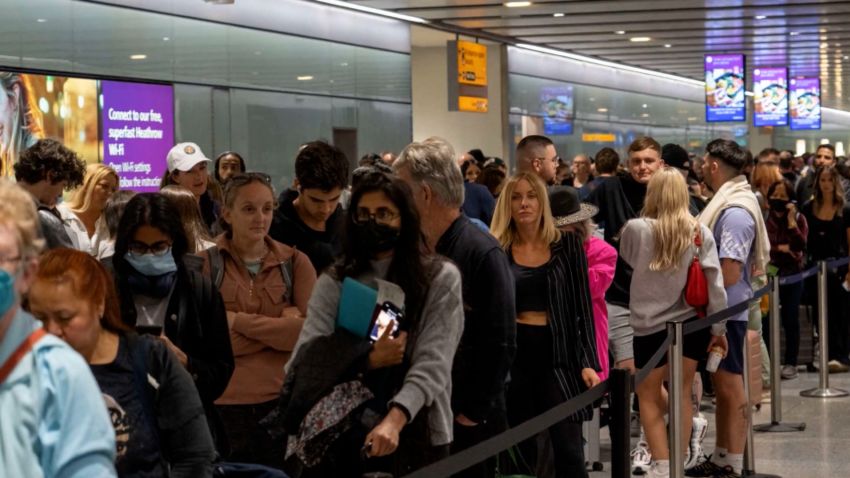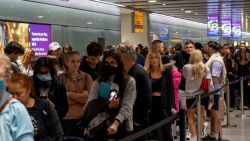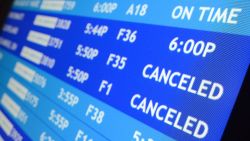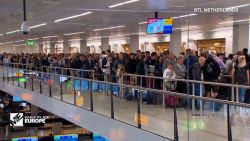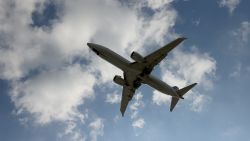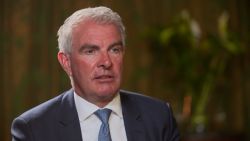Editor’s Note: This story is part of CNN Business’ Nightcap newsletter. To get it in your inbox, sign up for free, here.
Good news and bad news, America:
- The US dollar and the euro are officially even, which should make your European summer vacay easier on the budget. A croissant and a coffee for 10 euros would have cost you about $11.80 in 2021. Not it’ll cost 10 bucks. No, it’s not a ton of money saved, but the real joy is in not having to do math in your head while also stumbling over the five words of French you’ve retained from junior high and seven minutes on Duolingo.
- But physically getting across the pond might be hell.
Here’s the deal: Just in time for American travelers to get one financial break after a year of surging prices, airports around the world are buckling under the pressure. Everyone’s trying to get out of town, often for their first real vacation in two years, but airports around the world don’t have enough staff to handle the rush.
On Tuesday, London Heathrow, one of the world’s busiest international airports, asked airlines to stop selling tickets for the summer and announced a cap on the number of departing passengers it will allow to fly each day.
“Over the past few weeks, as departing passenger numbers have regularly exceeded 100,000 a day, we have started to see periods when service drops to a level that is not acceptable,” said Heathrow’s CEO John Holland-Kaye in an open letter to passengers.
No more than 100,000 departing passengers per day will be allowed to fly out of Heathrow until mid-September, he said. That’s slightly less than the estimated 104,000 a day the airport might otherwise host this summer.
Airlines, dealing with their own staffing shortages, have already scaled back their summer schedules.
British Airways, for one, has cut about 30,000 flights — not including last-minute cancellations — since the start of the season, according to the Wall Street Journal.
But Holland-Kaye said Heathrow’s latest forecast showed an excess number of seats had already been sold, so airlines needed to stop selling tickets immediately.
BIG PICTURE
Our collective appetite for a good holiday roared back much faster than airports and airlines could rehire the staff they let go of in the spring of 2020. You can blame airlines or onerous regulations, depending on your perspective.
In the best of times, hiring airport workers can be a lengthy process involving background checks and clearances. British Airways told lawmakers in June that it had around 3,000 potential recruits stuck in background checks that are taking up to four months. Other airline executives in that hearing were quick to blame onerous regulations for the travel chaos playing out at airports.
And that’s fair — customers want to know their baggage handlers and ground crew have been thoroughly vetted, but in a labor market as tight as this one, it’s even harder to recruit for those positions.
Heathrow “clearly got it completely wrong,” said Willie Walsh, director general of the International Air Transport Association, the group representing global airlines. “To tell airlines to stop selling — what a ridiculous thing for an airport to say to an airline.”
But airlines have to shoulder some blame here, too. US carriers let go of tens of thousands of workers through buyouts during the pandemic even as they received billions of dollars in payroll aid, courtesy of the American taxpayer. Now they’re overselling flights that air-traffic controllers can’t possibly keep up with, taking advantage of sky-high fuel prices and strong demand to raise prices.
Bottom line: Be prepared for summer travel chaos. And possibly fall, too. If you’re the kind of person who flies anywhere for Thanksgiving, aka the busiest travel day of the year, aka the worst possible time to test the strained infrastructure of America’s aviation industry … woof, good luck.
NUMBER OF THE DAY: 16
Starbucks is planning to close 16 locations in the United States, citing employee complaints about safety concerns. The closures will hit stores in Seattle, Los Angeles, Philadelphia, DC, and Portland, Oregon.
The moves are part of a broader effort to revamp the company, as outlined in a Monday letter from CEO Howard Schultz, who stepped into the role for the third time this spring. Starbucks must “radically” improve employee experiences, he wrote, adding that the company would strive to create “safety, welcoming and kindness for our stores.”
To be clear, Schultz is also trying to institute a decidedly anti-union ethos within the Starbucks rank and file — something he’s had only limited success with so far.
BACK PEDAL
More than two years after the pandemic hit, many of the businesses who profited the most from its upheaval are facing a reckoning. Somewhat ironically, investors are retreating to their bunkers, shunning risky behavior, while consumers are emerging from their hideouts, ready to splurge even as the virus remains a threat.
That’s bad news for the companies who built their brands on the shaky ground the earthquake of Covid-19 left behind.
Few companies have had their fate as closely linked to the pandemic as Peloton, whose pricey stationary bikes sparked something of a movement around the idea of staying put. For those who could afford the internet-connected bikes (and treadmills, but mostly bikes), they offered a portal to a community beyond one’s own quarantine pod. There was bumping music and a dark room full of sweaty strangers — if you squinted, it could feel like a party from the Before Times.
Unfortunately, Peloton hasn’t been able to handle the heat.
Here’s the deal: In the latest sign of trouble at the home-fitness company, Peloton has decided to stop making its own bikes and treadmills, in favor of a third-party Taiwanese manufacturer, my colleague Jordan Valinsky reports. This is a drastic change for the company as it struggles to cut costs.
Peloton will shut down its factories operated by Tonic Fitness Technology, a company it bought in 2019. About 600 Tonic staff will be laid off, according to Bloomberg.
Why it matters:
- Peloton spent hundreds of millions to secure US-based production, believing demand would remain high. It also hoped to avoid the ocean-bound supply chain bottlenecks that have dogged global trade since 2020.
- But the company badly misjudged society’s desire to work out alone in front of a screen forever. Subscription sales have stagnated as people have returned to gyms.
- After struggling to fill orders in a timely manner during its pandemic heyday, Peloton now has too much inventory.
- This is the first major cost-cutting measure from CEO Barry McCarthy, who was installed in February as part of a shakeup that included laying off nearly 3,000 employees.
On Tuesday, Peloton shares rose 3.5% on the news. But its stock is still down nearly 95% from its all-time high in late 2020.


